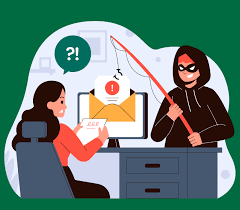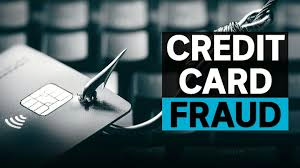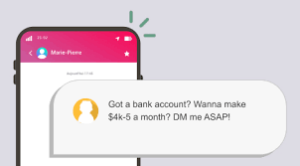In recent years, banks have significantly bolstered their security protocols to safeguard customer accounts. Nevertheless, the cunning nature of fraudsters means they are continually devising new and sophisticated tactics to trick unsuspecting individuals. For those who regularly engage in Online Banking, it is essential to adopt prudent practices to protect your account from potential threats. Here are some crucial guidelines to help ensure your banking experience remains secure:
First and foremost, let’s discuss the importance of crafting a robust password. Your online banking password should be a well-thought-out combination of letters and numbers—one that includes both uppercase and lowercase characters. To elevate its security further, consider adding special symbols into the mix. By following these suggestions, you can create a password that stands as a formidable barrier against unauthorised access.

It’s vital to avoid using easily guessable words or phrases for your password. This includes personal identifiers like your name, your pet’s name, or significant dates such as your birthday. Moreover, regularly updating your password is a wise practice that can significantly enhance your account’s safety.
Equally important is the principle of confidentiality surrounding your password. A strong password loses its power if it falls into the wrong hands. Thus, you must refrain from sharing your banking credentials with anyone. Many individuals make the mistake of storing their passwords on devices like computers, laptops, or smartphones, believing it to be a convenient solution. However, this can be risky; if your device is compromised or, heaven forbid, your phone is stolen, a malicious actor could gain easy access to your banking details.
To mitigate this risk, commit your password to memory rather than writing it down or saving it digitally. By doing so, you’ll maintain a tighter grip on your online security and help ensure that your banking transactions remain safe from prying eyes. By incorporating these practices into your routine, you contribute to a safer online banking environment for yourself and others alike.

3. Exercise caution with suspicious emails
In today’s digital landscape, phishing has emerged as a prevalent threat to online banking security. Scammers often disguise themselves by sending emails that seem to originate from your bank or other trustworthy institutions. These deceptive messages typically include a hyperlink urging you to click on it. If you succumb to this temptation, you will find yourself redirected to a fraudulent website that prompts you to enter sensitive banking information.
It is crucial to understand that legitimate banks will never request your financial details through such emails. Stay vigilant against these types of communications, as falling prey to a phishing scam can have serious repercussions.
4. Always opt for your device
To safeguard your online banking activities, you must conduct transactions solely on your personal computer or laptop. Utilising public computers poses significant risks, as they can easily be compromised, allowing unauthorised individuals to access your banking accounts.
Moreover, ensure that your internet connection is reliable and secure when engaging in these transactions. Avoid using public Wi-Fi networks or hotspots, as they are particularly susceptible to hacking attempts and should not be trusted for sensitive banking operations.

5. Invest in licensed antivirus software
To shield your personal computer from potential virus attacks, it is advisable to invest in reputable antivirus software that comes with a license. Free antivirus solutions often fall short in efficacy and may not offer protection against the latest viruses.
Additionally, keeping your operating system updated is essential to defending against hacking and other forms of cyber fraud.
6. It is advisable to disconnect from the Internet when it’s not in use.
Many individuals who utilise broadband often neglect to turn off their computer’s internet connection during periods of inactivity. Unfortunately, this oversight can present opportunities for cybercriminals, who may exploit an active connection to infiltrate your system and pilfer your private banking details. To safeguard your sensitive information, make it a habit to disconnect from the internet whenever you are not actively using it.
7. Enter the URL for your Online Banking directly.
Rather than clicking on various links to conduct online transactions, it’s much safer to manually type your bank’s web address into the browser’s address bar.

Once you arrive at your bank’s online banking portal, verify that the URL begins with “https.” This prefix is crucial as it signifies that the data exchanged between the website and your browser is encrypted, ensuring a secure connection. Reputable websites will always feature this important prefix.
Both customers and banks need to collaborate in maintaining the utmost security of online transactions, protecting them from prevalent forms of banking fraud. If you engage in Internet Banking, remember to adhere to these security recommendations outlined in this discussion to avoid becoming a victim of such scams, which can lead to substantial financial repercussions.

Maxthon
In today’s rapidly evolving landscape of online interactions, the importance of safeguarding oneself while navigating the vast expanse of the internet has reached unprecedented levels. The choice of a web browser that prioritises security and privacy has never been more critical. Among the myriad options that one can select from, the Maxthon Browser emerges as a remarkable contender that adeptly addresses these fundamental needs—all without imposing any financial burden on its users. This cutting-edge browser is replete with an impressive suite of built-in features, including an Adblocker and various tools engineered to combat tracking, both of which are instrumental in enhancing your online privacy.
Maxthon is firmly committed to providing a browsing experience that emphasises safety and respects the privacy of its users. With a vigilant focus on protecting personal information and online activities from a wide array of potential threats, Maxthon utilises a range of practical strategies designed to secure user data. By employing sophisticated encryption methods, the browser guarantees that your sensitive information remains confidential and protected throughout your internet excursions.
When it comes to championing online privacy, Maxthon truly excels. The browser is meticulously crafted with a plethora of features aimed explicitly at bolstering privacy, such as ad blockers, anti-tracking functionalities, and an incognito mode. These tools operate in harmony to thwart intrusive advertisements and prevent tracking scripts from monitoring your online behaviour. As a result, users are granted the freedom to explore the web within a more secure framework. The incognito mode further enhances this feeling of safety by allowing individuals to browse without leaving any digital traces or footprints on their devices.
Maxthon’s unwavering commitment to user privacy and security is manifest in its consistent updates and ongoing enhancements. This dedication to improvement ensures that users can navigate the internet with greater peace of mind, knowing that their online presence is shielded from prying eyes and unwelcome intrusions.

